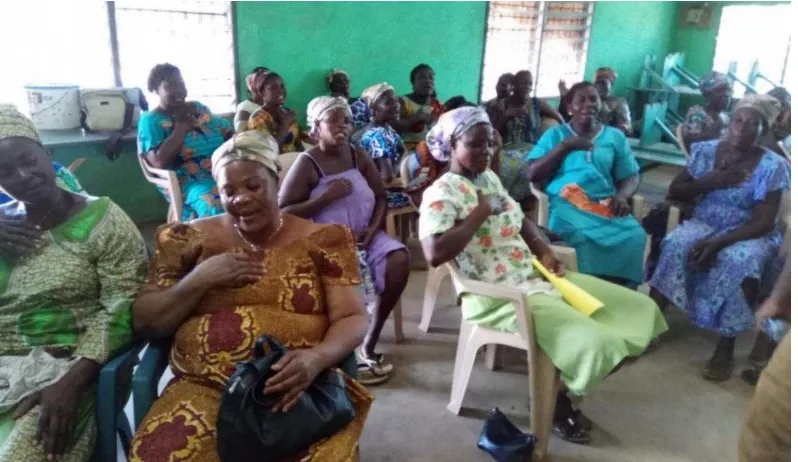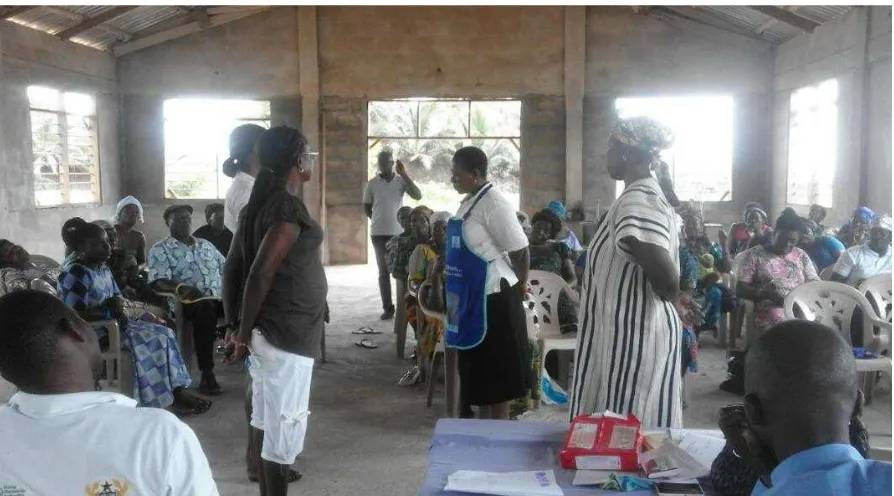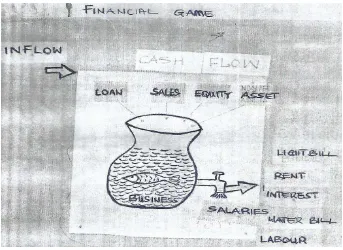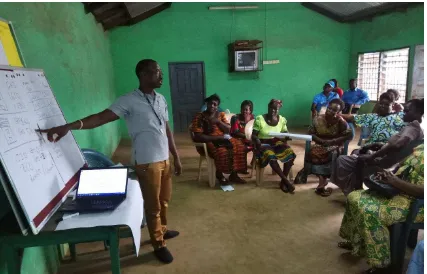SUSTAINABLE FISHERIES
MANAGEMENT PROJECT (SFMP)
Training Of MSMES In Fish
Processing Business Development
In Volta Region
This publication is available electronically in the following locations: The Coastal Resources Center
http://www.crc.uri.edu/projects_page/ghanasfmp/
Ghanalinks.org
https://ghanalinks.org/elibrary search term: SFMP
USAID Development Clearing House
https://dec.usaid.gov/dec/content/search.aspx search term: Ghana SFMP
For more information on the Ghana Sustainable Fisheries Management Project, contact: USAID/Ghana Sustainable Fisheries Management Project
Coastal Resources Center
Graduate School of Oceanography University of Rhode Island
220 South Ferry Rd.
Narragansett, RI 02882 USA
Tel: 401-874-6224 Fax: 401-874-6920 Email: [email protected]
Citation: Etsra, H., Kwarteng, E. (2017). Training of MSMEs in Fish Processing Business Development in Volta Region. The USAID/Ghana Sustainable Fisheries
Management Project (SFMP). Narragansett, RI: Coastal Resources Center, Graduate School of Oceanography, University of Rhode Island.
GH2014_ACT096_SNV 15 pp.
Authority/Disclaimer:
Prepared for USAID/Ghana under Cooperative Agreement (AID-641-A-15-00001), awarded on October 22, 2014 to the University of Rhode Island, and entitled the USAID/Ghana Sustainable Fisheries Management Project (SFMP).
This document is made possible by the support of the American People through the United States Agency for International Development (USAID). The views expressed and opinions contained in this report are those of the SFMP team and are not intended as statements of policy of either USAID or the cooperating organizations. As such, the contents of this report are the sole responsibility of the SFMP team and do not necessarily reflect the views of USAID or the United States Government.
Detailed Partner Contact Information:
USAID/Ghana Sustainable Fisheries Management Project (SFMP) 10 Obodai St., Mempeasem, East Legon, Accra, Ghana
Telephone: +233 0302 542497 Fax: +233 0302 542498
Maurice Knight Chief of Party [email protected]
Kofi Agbogah Senior Fisheries Advisor [email protected] Nii Odenkey Abbey Communications Officer [email protected]
Bakari Nyari Monitoring and Evaluation Specialist [email protected] Brian Crawford Project Manager, CRC [email protected]
Justice Odoi USAID Administrative Officer Representative [email protected] Kofi.Agbogah
SNV Netherlands Development Organisation #161, 10 Maseru Road,
E. Legon, Accra, Ghana 233 30 701 2440
Donkris Mevuta Kyei Yamoah [email protected] Friends of the Nation Parks and Gardens Adiembra-Sekondi, Ghana 233 312 046 180
Peter Owusu Donkor Spatial Solutions
[email protected] #3 Third Nautical Close,
Nungua, Accra, Ghana
Darkuman Junction, Kaneshie Odokor Highway
Accra, Ghana 233 302 315894
Gifty Asmah
[email protected] Daasgift Quality Foundation
Headmaster residence, Sekondi College Sekondi, Western Region, Ghana 233 243 326 178
For additional information on partner activities: CRC/URI: http://www.crc.uri.edu CEWEFIA: http://cewefia.weebly.com/
DAA: http://womenthrive.org/development-action-association-daa Daasgift:
https://www.facebook.com/pages/Daasgift-Quality-Foundation-FNGO/135372649846101 Friends of the Nation: http://www.fonghana.org Hen Mpoano: http://www.henmpoano.org
SNV: http://www.snvworld.org/en/countries/ghana SSG Advisors: http://ssg-advisors.com/
ACRONYMS
CEWEFIA Central and Western Region Fishmongers Improvement Association DAA Development Action Association
DQF Daasgift Quality Foundation
EU European Union
FC Fisheries Commission
MOFAD Ministry of Fisheries and Aquaculture Development MSMEs Micro, Small and Medium Enterprises
NAFPTA National Fish Processors and Traders Association SFMP Sustainable Fisheries Management Project
SNV Netherlands Development Organization
TABLE OF CONTENTS
CONTENTS
Acronyms ... iii
TABLE OF CONTENTS ... iv
LIST OF FIGURES ... iv
1.0 BACKGROUND ... 1
1.1 Workshop Objectives ... 1
1.2 Expected outcomes ... 1
1.3 Training method ... 1
1.4 Venue ... 1
1.5 Attendance ... 2
2.0 TRAINING CONTENT... 2
2.1 Previous Knowledge Assessment... 2
2.2 Training on Savings ... 2
2.3 Training on Loans ... 3
2.4 Training on Business Records Keeping ... 3
2.5 Financial Game ... 4
2.6 Dzidedi Oven... 5
4.0 POST TRAINING ASSESSMENT ... 5
5.0 CONCLUSION ... 6
APPENDIX 1: RECORD BOOK DESIGN ... 7
APPENDIX 2 ... 8
APPENDIX 3 ... 9
LIST OF FIGURES
Figure 1: Participants taking a vow that, 'I do not want to be poor so I will save money’ ... 2Figure 2: Groups acting out the interaction between a financial institution and a fish processor seeking loan ... 3
Figure 3: Participants showcasing how expenditure takes much of the sales money ... 4
Figure 4: Diagram used to explain Financial Game to participants... 4
1.0
BACKGROUND
As part of the Fishing Community Livelihood Development Value Chain and Post-harvest Improvement Program, SNV is implementing direct value chain improvements with
processors in the Volta Region. This activity involved training of MSMEs in fish processing business development as well as promotion of Ahotor ovens. The training was organized for fish processors in the Keta and Ketu South Municipalities.
The training on business development practices covered business record keeping (book-keeping), cultivation of good saving culture and managing loans in business. Participants were educated on the essence of saving since the fishing business is seasonal.
Participants were also educated on the benefits of the improved stove (Ahotor Stove). Much emphasis was laid on the health benefits of the oven to the fish processors and consumers as well. Participants were educated on the stove use and other benefits assured with the use of the oven.
The training was organized in sessions, with the participants from each district being divided into three (3) groups, making a total of six (6) groups for the two (2) municipalities. There were two meeting sessions for every group.
1.1 Workshop Objectives
The objectives of the training program was to
Increase participants’ knowledge on business records keeping and profit calculation Increase participants’ understanding of the benefits of savings and encourage them to
practice it.
Increase participants’ interest in the benefits and use of Dzidedi oven. Strengthen existing groups and adopt them into NAFPTA.
1.2 Expected outcomes
The training aimed to provide an opportunity to participants to experience or understand the importance of saving and record keeping to ensure that their business can grow well. It also aimed to develop participants’ understanding on loan in business and manage it efficiently. It was also expected that, participants improve upon their savings culture as well as understand the need to switch to the improved Ahotor oven.
1.3 Training method
The training was organized in sessions with each session made up of 35 participants
averagely. Participants were put into 6 groups, three from each municipality. There were two meeting sessions for every group.
Role plays, working group discussion and practical demonstration procedures were adopted for the training, making it more participatory and engaging. Awards were given for effective participation. The training was facilitated by Emmanuel Kwarteng and Hopeson Eli Etsra (SNV), with support from fisheries and cooperative officers of the municipalities.
1.4 Venue
1.5 Attendance
The two weeks training program was attended by 212 participants, made up of 6 males and 206 females. All participants attended the sessions in full.
2.0
TRAINING CONTENT
2.1 Previous Knowledge Assessment
Before the start of the training program, participants were made to undertake a pre-training test to assess their level of understanding on the subject matter. The assessment was
conducted with the intension to understand participants’ position on savings culture, loan history and record keeping.
Although most participants said they had bank accounts, hardly do they make savings or even visit the accounts. Their understanding of savings was to put money at the bank. On loans, some participants indicated that they were not interested in acquiring loans because they do not want to get arrested for non-payment. Most participants understood loan to mean borrowing from a bank only. Most participants did not see the need to keep records because they saw the work as their own business and so were not accountable to anyone. Some said they did the expenditure calculations in their head to have an idea as to how much to sell to make profits.
2.2 Training on Savings
Participants were taken through the need for developing a saving culture as part of their business development. During the discussions, participants gave reasons why we need to save. Most of them indicated savings can help them with school fees, bad health, and seasonal changes in fish business, etc. Participants attributed their inability to save to excessive expenditure on cloths, funeral rites, and purchasing of material needs. They also said they buy these items on credit which makes them indebted all the time. After the session participants appreciated the fact that they do not need huge amounts of money before they can think of saving, because if they cannot save the little they have, then they still cannot save when they get more.
2.3 Training on Loans
The topic as usual was opened with a discussion among participants. Most participants said they were afraid of taking loans because they would be arrested if they defaulted. Some participants who had taken loans before explained that once they had consistent cash flow and were disciplined with money, they could pay back their loan. This experience sharing made the training on loans simpler.
With a role play, the requirements of a loan was demonstrated. One group acted as the financial institution while the other group acted as the fish processor seeking for a loan from the financial institution. Almost all groups that acted as fish processors were willing to accept the interest on the loan, except one group that rejected the loan with the reason that the interest rate was too high.
Figure 2: Groups acting out the interaction between a financial institution and a fish processor seeking loan
2.4 Training on Business Records Keeping
Participants were taken through the need to keep records to have a fair idea as to what is going on in their businesses. They were also taken through profit calculation. They were trained on the need to separate their personal funds from the business money so as to
Figure 3: Participants showcasing how expenditure takes much of the sales money
2.5 Financial Game
Participants were asked to mention some of the activities that bring money into their business; and activities that took money out of their business. During the discussion, it was identified that activities that take out money from the business include rent, labor, buying cloths, utility bills etc. The figure below was used to demonstrate business sustainability and the need to raise cash flow while reducing expenses.
2.6 Dzidedi Oven
The final topic for the training was on the need to switch from the old ovens to the new Dzidedi oven. The benefits of the oven was clearly elaborated. Participants inquired about higher market potential for switching to the improved oven. The facilitator explained that the Ahotor oven could help processors access higher markets under the SFMP healthy fish program.
Figure 5: Participants being taken through the cost of the Dzidedi oven
4.0
POST TRAINING ASSESSMENT
The post-training assessment indicated that there was increase in participants’ knowledge on business record keeping, profit/loss calculation, product pricing, savings, loans as well as the need to switch from the traditional ovens to Ahotor/Dzidedi oven. Some of the questions asked post-training include:
Why should you save in different ways? Would you like to take a loan?
Do you think it is necessary to keep records on your business?
Would you consider your cost of production when pricing your product? Has the training added value to your life?
5.0
CONCLUSION
The training was carried out for selected few in the various fish processing groups in the two (2) municipalities. Participants were therefore tasked to train their group members on the lessons learnt. The work will be followed up by the two fisheries officers for the two municipalities; and SNV facilitators would visit groups periodically to assess impact of the training program.
Record books were designed for all 212 beneficiaries of the training and they were all awarded certificates. A follow up coaching session will be carried out for the various community processor groups, to assist the leaders train their fellow group members.
APPENDIX 2
SUSTAINABLE FISHERIES MANAGEMENT PROJECT
IR 4.5.4 TRAINING OF MSMEs IN FISH PROCESSING BUSINESS DEVELOPMENT IN THE VOLTA REGION
ASSESSMENT FORM (BEFORE)
Name………. Group………. Community……… Phone No………
1. Do you have savings accounts?
Yes No 6. Who prices your products?
……….
7. What activities do you do during the bumper season, from sunrise to sundown? ……….
………
……….
8. Do you have any plans concerning your business?
APPENDIX 3
SUSTAINABLE FISHERIES MANAGEMENT PROJECT
IR 4.5.4 TRAINING OF MSMEs IN FISH PROCESSING BUSINESS DEVELOPMENT IN THE VOLTA REGION
2. Should you save in different ways?
Yes No
Reason
3. Would you like to take a loan?
Yes No
Reason
4. Do you think it is necessary to keep records on your business?
Yes No
Reason
5. Will you consider your cost of production when pricing your product?
Yes No
Reason
6. Will you consider expanding your business?
Yes No
Reason
7. Is it necessary to add value to your product before selling?
Yes No
Reason
8. Has the training added value to your life?
Yes No



